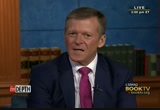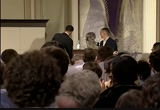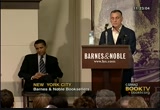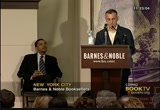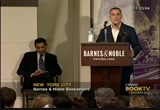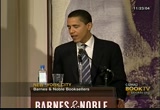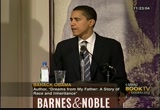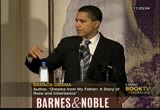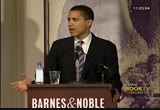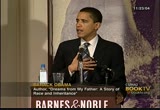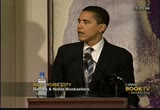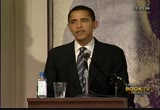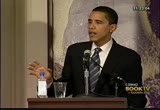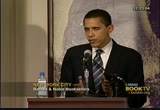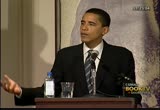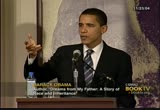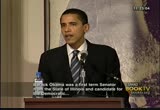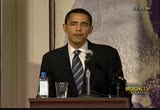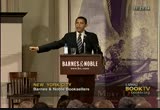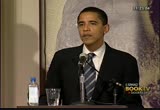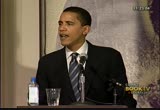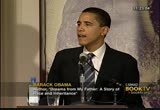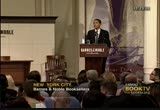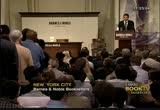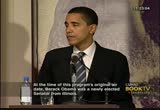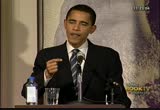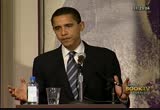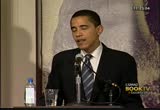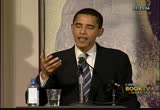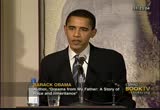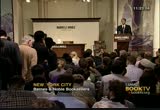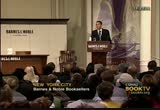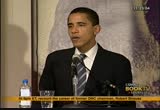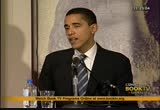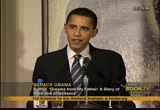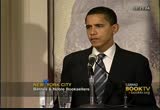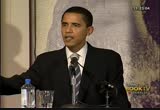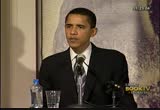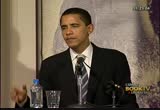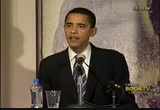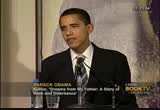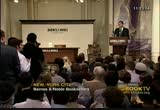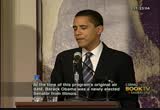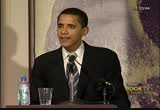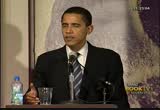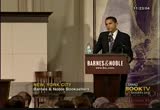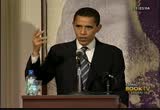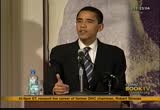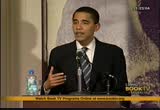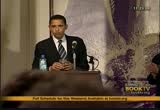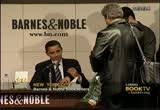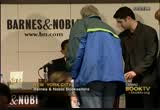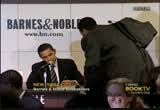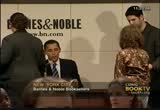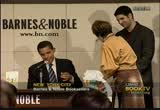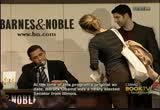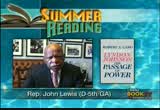tv Book TV CSPAN September 2, 2012 3:00pm-4:00pm EDT
3:00 pm
3:01 pm
>> well, good evening, everyone. thank you for joining us. on the morning of november 3, millions of americans woke up to find that the man they voted for was elected president. [l you millions of other americans >> millions of other americans, -- they almost -- [cheers] [cheers]pointmen almost in equal numbers woke upr to a great disappointment.at leo for those americans, there was at least one saving grace. the man who had been the dynamic
3:02 pm
voice of the democratic convention, the keynote speaker, the man who spoke of big dreams in his own life, and big dreams elr his country, had actually been eleeccted, the senator from illinois. [cheers] [applause] [cheers] [applause]tonigh barack that man is our guest tonight. barack obama.spoke o [cheers]is in his convention speech, he spoke of his father. a foreign student raised in aer village in kenya. he spoke of his grandfather, a domestic servant. and he spoke of the journey has taken in his own life.d that story, which brings him here tonight, is told more full in his book called "dreams from
3:03 pm
my father." there is much talk about what our guest will be doing in the year 2008. through 2012 and beyond. i and it would certainly give me pleasure to say[a that i was introducing the next president of the united states. [cheers] [applause]ep and it would give you a lot of pleasure as well, i'm sure. millions whon woke up in is wh disappointment on november 3, they might be looking to what our guest will be doing in theeu immediate future.on the jou based on the journey and the stance he has taken, many americans should rejoice overict that the voice they will have ir their government. the
3:04 pm
a voice that speaks for expanding opportunities and civil liberties. a voice that speaks to the promise that will help us come out of the long local darkness. obamse join me in welcoming the man behind not always, barack obama. [cheers]thank yo [applause] [cheers] [applause] >> thank you, thank you. thank you. thank you very much.. [cheers]ppreciate it [applause] thank you, i appreciate it. thank you very much. thank you so much. but i know that i made a speech tha] there are no red states and blue states, but i suspect that thisc state is kind of blue looking at the crowd out here tonight. what a magnificent turnout. i am so grateful to all of you f
3:05 pm
escially in he time out of your day to travel here, especially in new york traffic, which i just breathed myself. much smler when the book first came out in, i had a much smaller reception.e this is one of the stuff that is made, and it is wonderful to be ack, close to 10 years later, and to also see how things have. grown.'m going too i i am very grateful to all of you for being here. what i'm going to do is spend an few minutes talking a little biy about my perspective, asampaigna expressed not only in thend boo, but also in the campaign and how those things connect. we will open it up for t questis
3:06 pm
before we did a book signing.g i just had an appearance on charlie rose. he was asking me, how does the book connect with your politicse it is very clear to me that there is a direct line between the subject matter that istics e contained in "dreams from my father" and the type of politics that i aspire. essentially, what the story is about is a boy, born to a fathen from kenya and a mother from kansas, in hawaii with an unusual name, who traveled to indonesia, came back and found himself in chicago, working in some of the most lowest income neighborhoods in the country. t then travel back to africa. somehow was able to weave
3:07 pm
together a workable meaning for his life as an african-american, broaan american, and somebody who is part of the broader human family.t have that was not an easy task. easy task not because i didn't have some ofid enormous love for my family. because i did. it wasn't because i didn't havet people helping me every step of the way. i did have that hell. but it was because i found born id a that myself divided. divided along lines of race, divided along lines of class, divided along lines of religion. and so we have this enormous tragic history that all of us confront, from whatever our
3:08 pm
backgrounds are, whether we're white, black, hispanic, asian, muslim, jew, or christian. the notion that in fact in the words of a great writer who happened to win a nobel prize, william faulkner, he said the past is never dead and buried. it isn't even past. and i think that all of us are confronting constantly our history. we're confronting the history of slavery in this country. we are confronting the history and problems that arose as a consequence of colonialism. we're confronting those scars of violence and oppression and struggle and difficulty and hope not only on the larger canvas of history but also within our own families. and for me, it was not entirely
3:09 pm
obvious how, in fact, i was going to be able to integrate and pull together all those different strands in my life. so part of my challenge growing up was to figure out how do i function as someone who is black, but also has white blood in me. how do i function as somebody who is american and takes pride and understands the enormous blessings that come with being an american, but is also able to recognize that i'm part of something larger than just a nation state. how do i embrace my faith now as a christian also recognizing that i have people within my own family who have a different faith, and how do i describe the fact that we all have different paths ultimately to a
3:10 pm
same source, a same place, that we come from and to which ultimately we will all end up? how do we do that and what kind of language do we come up with? how do we expand a sense of empathy and allow each and every one of us to be able to stand in somebody else's shoes and see the world through their eyes, and as a consequence, see ourselves in other people? because it strikes me that that's the only way that we're going to survive as a planet. and so that was in very abstract terms what the theme of this book is about. now, in much more concrete and prosaic terms, what this book is about is a boy who is growing up and doesn't have a father around. and what i -- i start with the story of my father passing away. killed in a car accident. a father that i did not know well. somebody who had been part of
3:11 pm
that first generation of africans to study in the united states. and then had married an american woman. had had a child, but then had gone back to his own country. thinking that somehow he would be able to bring back technology and transformation through the knowledge that he had gained to help develop a country that was newly free. and i didn't really know his story very well. all i knew about my father for the most part during my upbringing was the stories that my mother told me. so i had a whole mythology about who he was. fortunately the mythology that my mother fed me was a very positive image. so i write about the fact that in the book, i grew up with an image of a strong black man who just didn't happen to be in the house. but was one of the smartest and
3:12 pm
most charismatic and brightest and honest people that you would ever care to meet. and so that was a mythology that i carried with me, despite his absence and despite living in a very different world than his. and it was only later that i started realizing that in fact this was a mythology, that his life was much more complex. and as a consequence of that realization, i rebelled in all sorts of ways and went through a lot of difficulties that are not unique to me. in fact, particularly among african american males, without fathers in the house, buffeted by a series of negative stereotypes that they see or at least confining stereotypes of what it means to be a black man in america. as a consequence of those things, i went in a whole negative direction that lasted throughout most of my teenage
3:13 pm
years. and what the book discusses then is how did i pull myself out of it, and it ended up being a matter of me recognizing that the struggles that i was going through internally to reconcile a divided heritage, to reconcile the different strands of my past, could only be done if i linked my story up with a larger story. the story of struggle taking place here in the united states with african americans, the struggle that's taking place overseas with the millions of people who are impoverished and don't have opportunity. and that's part of what led me directly into the kmuncht organizing work that i did, the civil rights work that i did, and ultimately into the politics that i'm still engaged in. and so in some ways, the themes of this book are very much the project of my life right now. which is to figure out how in fact can we live together as
3:14 pm
one people effectively, and what does that mean and what does that require, and what are the nature of our commitments to each other and what's the scope of our regard and concern. and that's not an easy question for us to answer. we just went through an election in which i think both sides simplified the nature of the problem and didn't necessarily offer a very good solution. you know, our politics so often functions as one side painting a character couture of the other side. the republicans happen to be better at characterizing democrats than the other way around. but part of what i meant when in my speech i said there are no red states and no blue states was the fact that the complexity of our lives is not fully captured in our political
3:15 pm
debate, that there are people in the red states who are devout christians and traditionalists who also think that part of the american tradition is tolerance. there are people in urban areas who are wine-sipping and volvo driving, but also think that we live in a dangerous world and we have to confront the threats that we face in the strongest of terms. and when we simplify our politics and we character couture each other, then i think that we're actually going in a direction that is entirely contrary to the best spirit of this country. and i actually am a believe in
3:16 pm
american kpeppingsalism. i know that's not always popular. but i believe in american exceptionalism that there is something special about this nation, precisely because this is a nation that is forced to constantly confront the fact that we're different. and yet somehow there are a set of core values and common beliefs that can bind us together as a single people. and if we can't pull off that experiment, here in the united states, then we can't be optimistic about what happens in northern ireland or the middle east or rwanda, because we have so much to build on. and the basic outlines of the government that we possess and our civic religion as a people is such that potentially at
3:17 pm
least we could create a society that is the model for the world. it isn't right now. and that's one of the tragedies, i think, of our foreign policy and our domestic policies as played out over the last several years. [applause] >> so the book ends with me traveling back to africa. and retracing then the steps that my father took and my grandfather took. my grandfather as those of you who have read the book or will read the book will discover was actually the first african in his village and in his circle ever to meet a white person. and almost immediately he had to confront what it meant to be drawn from a 15th century world
3:18 pm
into the 20th century world in the span of a single lifetime, and the enormous contradictions that he had to grapple with he ended up passing on to my father, and those contradictions my father has then passed on to me. the boy said that the problem of the 20th century is the problem of the color line. i think that oversimplifies it. it's not just a color line. it's class lines and gender lines and sexual orientation lines and religious lines. but i call this book a story of race and inheritance because the inheritance, the most important inheritance that i received, is the fact that i've got to grapple with the same issues that my grandfather and my father had to grapple with, that my mother and her parents had to grapple with.
3:19 pm
and that you have to grapple with. not only in your individual lives but also as american citizens and as citizens of the world. so hopefully what this book accomplishes, it's not to provide answers to all of these enormous questions, but it at least allows each and every one of us to recognize a piece of ourselves in maybe my story and as a consequence maybe you'll be able to recognize a piece of yourself in the person sitting next to you. and i'll close by just saying that i haven't had much of a break since the election. [laughter] >> somebody very charitabley told me -- i hadn't seen them in six months, and they said, you've really aged since i last saw you. and i said, well, thank you very much. but i am going to take a vacation, and i'm going to go
3:20 pm
back to hawaii for two weeks where my grandmother, who is now 82 and was born in augusta, kansas, a little old white lady, still lives, and she's got a bad back but she is as sharp as ever, and i'm going to -- my sister also lives there, and she is half indonesian. and she married a chinese canadian. [laughter] >> and so with my wife, who is a descendant of slaves from south carolina, who grew up on the south side of chicago, and my two gorgeous daughters, we're going to be visiting their new cousin. a little chinese girl who
3:21 pm
carries in her my d.n.a. and the prospect of watching those little girls run on the beach or crawl on the beach, depending on the progress that she is making, you know, i think is part of what all of us are working towards. is makes sure that their lives ultimately are rich and blessed in the way that they deserve. so hopefully that will be a project that all of us will be working on for many years to come. thank you. [applause] >> so i think what we've
3:22 pm
arranged is to take a few questions, and then i'm going to get busy. i've got my pen all ready. so those of you who have questions, i think you have to line up, and there may be unfortunately a cutoff point because if i'm going to be able to get through this crowd and we're going to get out of here by midnight, we may note able to take ery qution. so i apologize in advance for those of you who don't get your questions responded to. >> thank you, senator. i am the spiritual leader of a multifaith community that has felt very besieged by the issues of religion and faith and the way they have been used as a wedge in this country. i would really appreciate your reflections on how those of us who consider ourselves faithful people, whatever our faith, can be more proactive in combatting this very negative way of talking about religion. >> well, i think that that's a terrific question. there has been a lot of talk
3:23 pm
after the election about how we lost this election on moral values. first of all, i think it's an oversimplified analysis. the fact of the matter is that we were running against a personally popular wartime president, and one of the best political operations that's ever been created. we had some mistakes that we made, and we didn't have any margin for error during the course of the campaign. and when you've actually looked at -- when you look not at the exit polls, which were badly worded, but you look at where george bush gained votes and why people said they voted for him, he increased his margin here in manhattan as much as he did in the so-called rural areas where supposedly moral values held sway. and part of it had to do with
3:24 pm
people remembering 9/11 and ultimately not being persuaded that the democratic party was going to be as effective with respect to terrorism. i obviously disagree with that, and i could launch into a whole reason why we didn't make our case as effectively as we should. now, having said that, what is true is that the democratic party has not been particularly effective in the progressive community generally has not been particularly effective in describing its values and a narrative that relates to people's faith, their family, and their community. part of that is what i think started off as a good impulse, and that was our embrace of tolerance. and i think that there is a running strain in progressive politics and democratic politics that at some point, i
3:25 pm
don't know when it was exactly, equated religion with intolerance. and so the fear was, well, if we talk too much about religion, then we must be demeaning or putting down somebody else, so let's stop talking about it. and we then equated secularism with tolerance. now, that's a dangerous equation to operate under. and i think it's wrong. you know, there's a reason why dr. king was such a good preacher. he was a preacher. he wasn't just making a speech. and so those who, you know, were inspired by the civil rights movement have to understand that that was grounded in faith. that's why people were willing to subject themselves to fire hoses and dogs. and so i think it's possible for us to reclaim this
3:26 pm
territory that i think we've seeded to a very narrow and intolerant brand of faith. but it requires us being active in that arena and talking about our values and talking about the meaning of our faith in a way that's inclusive as opposed to exclusive. now, when we do that, it also has to be authentic. so if we go around toting our will binals and trying -- our bibles and trying to -- well, whatever our religious text is -- and try to be more righteous than somebody else, then we're playing a game, and people will sniff that out. so it has to be organic and it has to be internal and it has to come from within.
3:27 pm
and i think that that's something that i'm interested in engaging in, and i'll probably hopefully be working with people who are interested in these issues. there is a problem, though. there is a genuine one that can't be brushed aside. and that is that the nature of religious faith by definition is absolute. if you believe in allah, then you believe in allah all the way. if you believe in that jesus christ is your savior, then you can't say sort of. you believe that jesus christ is your savior. and the nature of political pluralism requires a certain measure of doubt. it's contrary to absolutism. it assumes that there are questions that have to be answered, and that i don't
3:28 pm
always have the right answer, and certainly that i can't trump deliberative discourse simply by saying, you know, god told so. that's not an option. and so there is that real tension. and all i can do is sort of say personally how i resolve this tension is by claiming that in fact my religious faith is premised on some measure of doubt. that's why it's faith and not science. and so what that means then is that, you know, i can admit that when i read scripture that i'm in this constant interpretation. i'm trying to figure out in my own sinful, imperfect way what exactly is god trying to say. and if that's the spirit that i bring to the public square, then you can reconcile those
3:29 pm
two things. but that's a difficult project. [applause] >> i have a comment followed by a question. my comment is i hope one day you do run for president of the united state i think i speak for everyone here. [applause] >> i know that wasn't a question, but let me remind people i rank 99th in seniority. i'm going to be -- as i told somebody the other day, i will be sharpening pencils and sweeping up when i get to washington. so i hope people don't take -- don't expect too much. >> my question is just looking at a book of current events or even before the election you saw, you know, a lot of books
3:30 pm
that were for president bush or for john kerry, against president bush, or against john kerry, books that came out bush is a liar, kerry is a liar, back and forth where there is no middle ground. in a senate that's going to be more polarized, which you're going to join soon, how are you going to bridge that divide? not just culturally with abortion, guns and god and whatnot, but with people just looking at who different worlds or two different americas. >> well, i think you're absolutely right that our political -- that the language we use politically is more than just polarized. i mean, it's poisonous. you know, i can't watch most of these cable news shows, you know, where these guys are yelling at each. what are you talking about? you're -- you know?
3:31 pm
[applause] >> and i confronted that in my own campaign. in the general election, i was running against a gentleman who proclaimed that jesus christ would not vote for me, which -- [laughter] >> my response was i wanted to know who his pollster was, because if he had a direct line on jesus christ, i had far more important questions to ask him. [applause] >> but, you know, there is this slash and burn, take no prisoners, anything goes politics that i just think is so corrosive to our democracy. and by the way, i think it's most damaging for progressives, not only because we're not as good at it, but also because what it does is it just turns
3:32 pm
people off of politics in general. and then leaves that space to be occupied by the special interests, who determine how the goodies are going to be passed out. so we've got to fight that. now how do we fight that? the best that i can do, i think, right now is to try to model the kind of politics that was successful at least in my campaign in illinois. and that is to try to disagree without being disagreeable, to try to find common ground where possible, to stand your ground on matters of principle, but not engage in cheap political shots or impugn the motives of people who come at issues in a different direction.
3:33 pm
and i don't know whether -- how i function -- how that will play when i get to washington. we'll find out. but one thing that i'm absolutely clear about. i think if you know what your convictions are, then you're in a position to compromise. when you're not clear about what your convictions are, then it just becomes sport. and it's when politics is treated as sport as opposed to actually trying to get something accomplished to help kids get educated or to provide health care to people who don't have it or to help senior citizens retire with dignity and respect, that's when i think you fall into the kinds of politics that we've been seeing. one last point i will make about this. i am disturbed about the fact that our vicious brand of politics has become so
3:34 pm
commercialy lucrative. there's an entire industry, as you mentioned, you know, these books are all on the best-seller list because they speak to a significant although still small sliver of the population that just likes raw meat like that. and so to the extent that it becomes commercialized, then it may get ginned up in the same way that w.w.f. wrestles gets ginned up or promoted. and i think we'll all have to be careful about that. [applause] >> as you demonstrated in your keynote address this summer, you are not afraid to
3:35 pm
diffrashte between the political personal. and i was interested to hear from the inspector general say that al qaeda and these people don't hate us for who we are but for what we do, for certain acts that have occurred in the past. and i was wondering if you could different yate amongst the generalities of them hating us for our values or flag or something, as to specifically why you think the tension was created to where osama bin laden would have a 70% approval rating in pakistan. >> well, the -- a couple of things. i think there's obviously a big question, and i may not be able to answer it completely here. i'll start by talking about a passage that's in my book actually, a chapter that's devoted to the three, four years that i spent in
3:36 pm
indonesia, which is actually the largest muslim country in the world. and when i arrived indonesia had its own problems because there had been a leader of the who was overtone in a military coup. the c.i.a. assisted in that coup. half a million people had been killed. but i was 6, so i wasn't paying attention to all of this. and my mother was only at the time 24. really didn't understand the history of it. she had remarried in indonesia. but that's all slightly beside the point. what is true, though, is that indonesia at that time was an explicitly secular government, despite the fact that there was the gout practice of islam -- dwoit practice of islam throughout the country. so women were able to wear skirts and work, and there was
3:37 pm
very little religious strife. and then after the asian financial crisis, the real incomes of the average indonesian dropped by about 30%. and it's right about that time that al qaeda began to get a foothold in indonesia. and now, you know, there are powerful strains of a perverted brand of fundamentalist islam that have taken root in that country. now, i'm not somebody who draws a direct line between poverty and fanaticism or ani simp. and i'm not interested actually in making too many excuses for somebody who would see people with such -- as such abstractions, with such contempt, that they would be willing to kill 3,000 people
3:38 pm
and think that they're making a political statement. there are no excuses for that, and that's where my empathy stops. i can't get into that mindset. but what i can understand is that if a child in pakistan has no prospects, no future, has watched their parents grind out terrible subsistence existence, and then the only avenues that they have for not only advancement but just some sense of meaning in their lives, is a school in which they are drilled with a very narrow, fundamentalist brand of islam, that then traps lates itself
3:39 pm
potentially into violent political act, not always but sometimes, that there is a connection there, and that our foreign policy and our perspective with respect to how to deal with terrorism has to reflect not only the interest in stopping the immediate threat of terrorism but also in creating a foreign policy that promotes justice, that promotes economic development, that promotes the rights of women, and that those are all central aspects to dealing with terrorism. ultimately, terrorism is a tactic. it's not -- we're not fighting terrorists. we're fighting people who engage in but have a whole host of rationals and excuses for why
3:40 pm
they do this. and to the extent that we can change the sense of opportunity in many of these countries, when we can change the manner in which we function in these countries in more positive, proactive ways, we're not going to eliminate terrorism entirely, but we'll at least make more of a dent then if all we're resorting to is military firepower. [applause] >> we only have time for two more questions, senator. >> i have a comment and a question. i read your book and loved it. thought it was very well written. >> thank you. >> yes, it is. and the part that really fascinated me, though, was the part where you go to africa to visit your relatives. my question is -- what was the reaction from your relatives to your recent election? and are they coming to the
3:41 pm
inaugural? >> well, the -- you know, this has been sort of -- nothing that i could have imagined. we're big in kenya right now. [laughter] [applause] somebody, you know, went out on safari somewhere and saw some masia in traditional garb with an obama button. so we've been big news in kenya as well as the entire, you know, continent. my understanding is that the same is true in south africa and other places. obviously, you know, that's heartening. although i think their information is not always right. there was an article about a
3:42 pm
little boy who was sure that i had -- i was running against george bush. that i had defeated him. [laughter] and then there was -- there was a -- and there's also a danger to it in the sense that my election then gets invested with a lot of expectations. partly because africa traditionally and negatively by the way thinks of politics what's been called the big-man model. the notion is the big man gets elected and he dispenses favors and gifts upon those who are his people. and so almost immediately, even before my election, people were saying well, once obama is elected, we'll get new roads, new schools, and so when i go back and i'm still broke --
3:43 pm
[laughter] and i try to explain to them that i'm 99th in seniority, i'm not sure how that's going to play. they may kick me back out. but obviously it is a very touching, the degree to which people have responded. and i take that -- that role seriously in the sense that one of the biggest challenges that i'm going to face is making sure that i am singularly focused on serving the state of illinois. and the people who elected me and doing a good job. [applause] but that i'm also, even as i do that, am able and willing to give voice to the voiceless in
3:44 pm
the corridors of power, where necessary. [applause] so i'm going to be -- so i have no qualms about speaking out on issues that are of particular interest to africa or african-americans or latinos or other minorities that are not always well represented. but i, marly now as i begin my career, my whole orientation is to make sure i'm the best possible senator from the state of illinois. i will not serve anybody else well if the folks back home start looking and saying the man is not answering his mail and he's not, you know, he's not returning phone calls and my social security check is still late and he hasn't done anything to help it. [applause] so unfortunately, i think this is the last question, is that right? go ahead. >> i first want to congratulate you on your victory.
3:45 pm
i think what we need for you to do is to do your job for the people of illinois and if you're ready to make that move, we'll all be here for you. >> thank you. >> but with that said, obviously you can tell there must be an enormous amount of pressure being the "rising star" of the democratic party. how are you handling that right now? >> you know, i'll be honest, maybe i'm not too bright because i don't feel that much pressure. i mean, there are some nuts and bolts aspects of this modest celebrity that i've achieved that are -- that have to be dealt with. i will probably get a significantly higher volume of mail than the average senator, because people from outside the state think that i'm going to be able to do something for them.
3:46 pm
and so i've got to tell you guys, if you plan to write me a letter, i may not be able to respond to the folks in new york. i apologize in advance. but, you know, we're getting a lot more invitations. we've gotten probably 200 invitations a week to speak at every, you know, progressive organization and naacp freedom fund dinner. so unfortunately i'm going to have to say no more than maybe i would prefer to as a freshman senator. but in terms of, i think, heightened expectations and my feeling about that, i'm not feeling very stressed about it, primarily because what i'm most concerned about are meeting, number one, the expectations of the people of illinois who gave me this great honor, and they're a pretty sophisticated bunch and
3:47 pm
know it takes time to get things done in washington. what they want to know is that i'm waking up every morning thinking about how to make their lives better and that i'm going to be consistent with the principles i laid out in the campaign in terms of trying to improve education and trying to make health care more accessible and affordable. and as long as i'm moving the ball in the right direction, moving the ball downfield, even if it's, you know, abinch at a time or a foot at a time and they know i'm working hard on their behalf, those expectations i think i can make. i have my family's expectations that i will conduct myself in a way that makes them proud, which means i'm honest and i have integrity and that i am thinking about them even in the maelstrom of work that i'm going to be engaged in. so i've got expectations. my 6-year-old and 3-year-old
3:48 pm
have expectations that i met this weekend taking them to "spongebob squarepants." but those are expectations i've got to meet. and then i've got my own expectations, and my own expectations are, i think, that i continually do this not because i'm interested in a particular political title or like people calling me senator, but that i'm doing it because i've got a core set of values that i think have to be advanced and that my individual salvation depends on our collective salvation. all right. thank you very much, everybody. thank you. [applause]
3:49 pm
>> if we have another felt tip pen, you know, that's not going to leach through. i always feel bad if -- you know. >> we're going to start with this lady. go ahead. >> thank you. thanks for being here. >> man, look at you. this guy single handedly is going to send my kids through college. >> by the way, -- [inaudible]
3:50 pm
>> what's your name? >> burton. >> good to see you, man. where do you live? >> great to see you. thank you. good luck to you. >> thank you. i appreciate it. where do you live? >> gibson, new york, two hours from now. >> is that right? >> [inaudible] >> what kind of work do you do? >> [inaudible] >> fantastic. how is rail service doing? >> all right. all right. >> they treating you guys ok? >> oh, yeah. >> i'll personalize this. this is for you? >> that's for me.
3:51 pm
>> there you go, burt. thank you. would you prefer blue? >> if you don't mind. >> i don't. >> thank you. >> there you go. >> this gentleman is doing his christmas shopping. >> i have friends that can't be here. >> so after all this, tell me which one is for you and i'll personalize that one. >> just dave, that will be fine. >> ok. what do you do? >> i'm a retired teacher. >> oh, wonderful. >> worked for new york city for 35 years. >> what did you teach? >> social studies, computer, math. >> one of the public schools in town? >> yeah. >> do you miss it? >> yes, i miss the kids. >> yeah, my sister taught in new york on the lower east side. >> i was in the south bronx.
3:52 pm
>> is that right? >> you can date that one and the other two. >> what is the date today? >> the 23rd. >> there you go. >> i was disappointed when you said you weren't going to answer your mail, because i wanted something to autograph. >> you know, it's just going to be impossible. >> oh, ok. thank you. >> thank you very much. >> thank you, sir. a pleasure. >> what is your name? >> chris. >> nice to see you, chris. going to school or working? >> going to school. thank you. >> great to see you. thank you very much. >> he was next in line. >> how are you? >> good. the truth is often the best
3:53 pm
director. i would like, if you could, to read this page, if you could, if you like, read the rest of it. >> all right. thank you. >> how are you? >> i'm andrew. >> nice to meet you, andrew. >> thanks for coming here. >> what grade are you in, andrew? >> 10th. >> fantastic. i don't do this for everybody, andrew, but i'm going to write you a little message. >> thank you. >> since you're just getting started. >> hopefully i'll be able to be one of your constituents. >> thank you. how are you? i would like to meet you. >> i would like to meet you. >> nice to meet you. thank you so much, with kenny
3:54 pm
johnson. >> i'm so nervous. >> how are you? >> fine, thank you. what is your name? >> beverly. >> nice to see you, beverly. >> great to see you. >> thank you nor coming today. >> best of luck. >> i appreciate you. >> she needs one more. >> we were so depressed with the election, but you're giving us hope. >> we have to pick ourselves up, dust ourselves off, keep going. >> how are you? >> hello, senator. you make me feel the most enormous relief. >> thank you. what is your name? >> natalie. >> nice to see you. do you have one of these books for you? >> oh, i do. >> i'm going to sign the last one just for you. >> that's wonderful. i was going to warn you about keeping your integrity, but i know i don't have to worry. you're so authentic, i love you. >> i appreciate you. when did you come to the states, natalie?
3:55 pm
you weren't born here. >> north london. >> that's what i thought. >> is natalie a traditional spelling? >> yes, and you have a natasha, huh? >> i do. >> i get called natasha sometimes. you said everything i needed to hear. i'm thrilled. >> thank you so much. i appreciate it. i'm fatima. >> i love that name. thank you so much. hi, how are you? >> i'm clara. what do i have to do to work for you? >> get -- if you get on our website, you can send an email to our website and right now, we've got about 700 that we have to sort through. do you have any hill experience? >> do i have any hill experience?
3:56 pm
what would that be? >> have you worked in washington before? >> no, i'm from the south bronx. >> it's not a requirement. i was just curious. >> i'm sorry. thank you. >> good. hi, how are you? nice to meet you. thank you so much. appreciate it. thanks for being here. thank you so much. whose book did i sign here? >> that was hers and this is hers as well. >> thank you so much. she's not 93. [inaudible] thank you very much. you're very kind. ? for more on barack obama, visit barack obama.com.
3:57 pm
>> here's a look at some upcoming book fairs and festivals happening around the country. the atlanta journal-constitution book festival will take place august 31 through september 2. it highlights interactive children's features and poetry slams. and the heritage festival will be in saint augustine, florida, the weekend of september 13. award-winning author jeff lindsay will be the keynote speaker. september 22 and 23rd, kirklin franklin will host the northwest the press. it will feature presentations, including appearances from blaine harden and best-selling author, boyd morrison. also the weekend of september 22, booktv will be live from the national mall in washington dc for the national book festival. be sure to check booktv.org for updated information on live author panels and interviews. please let us know about book fairs and festivals in your
3:58 pm
area, and we will add them to our list. e-mail us at booktv@c-span.org. >> will be reading this summer? booktv wants to know. >> i am reading three books this summer. there is a little book that i'm reading called across that bridge. i just want to go back and read it. and i want to see and reexported another book is by robert caro about lyndon johnson.
3:59 pm
[inaudible] in 1965, 47 years ago. to read his story and unbelievable ability to get things going is amazing. it's a big book. and it is almost too heavy to travel with. but i've been wanting to read it and that is a great book. there's another book that came out just a few days ago about the congress. that is dennis copeland, a great book about the congress and this is going to be a tough book to read. >> for more information on this and other er
165 Views
IN COLLECTIONS
CSPAN2 Television Archive
Television Archive  Television Archive News Search Service
Television Archive News Search Service 
Uploaded by TV Archive on

 Live Music Archive
Live Music Archive Librivox Free Audio
Librivox Free Audio Metropolitan Museum
Metropolitan Museum Cleveland Museum of Art
Cleveland Museum of Art Internet Arcade
Internet Arcade Console Living Room
Console Living Room Books to Borrow
Books to Borrow Open Library
Open Library TV News
TV News Understanding 9/11
Understanding 9/11